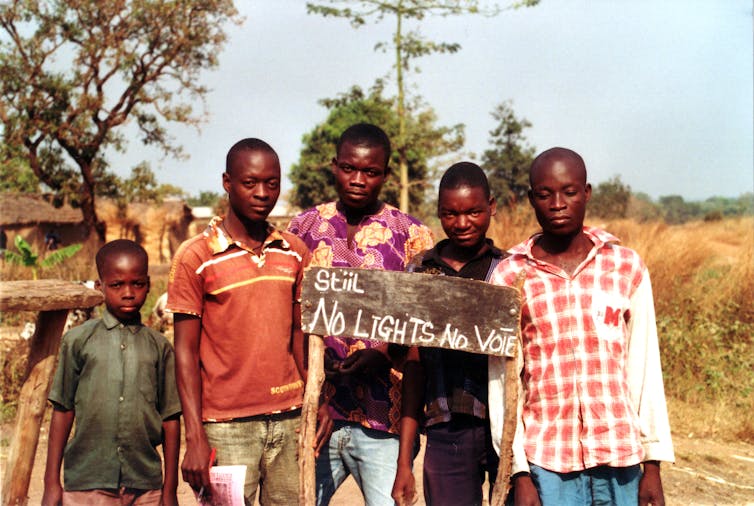
Wikimedia Commons
Alexander Diani Kofi Preko, University of Professional Studies Accra
November 21, 2019//-The use of soundbites – short, catchy, emotionally laden and sometimes witty summaries of politicians’ messages – has increasingly become a part of political election campaigns.
A growing body of research has looked at the implications, including how they strengthen political messages, create awareness and increase political participation.
In Ghana, the use of soundbites has become an essential component of elections since the country’s return to democracy in 1992. Political parties in Ghana have created various soundbites to appeal to the electorate during elections. Examples include the use of the word “Edzumawura”, which means “owner of jobs”. This is synonymous with creating employment for the country. Another example is 1D-1F, which stands for “one district one factory” – the slogan of President Nana Akufo-Addo.
We conducted research on the use of soundbites in Ghana to find out whether Ghanaian voters rationally or emotionally analysed them before voting for a political party.
We believed it was important to understand these dynamics because Ghana is held up as a beacon of democracy in Africa and made substantial democratic progress with seven successful presidential and parliamentary elections between 1992 and 2016.
One question we sought to answer was: does the Ghanaian voter rationally or emotionally analyse the soundbite before casting his or her vote during an election?
We found that Ghanaian voters actively engaged with soundbites during election campaigns. And we found that they used a rational approach – that is they considered a number of objective factors. But that they were also swayed emotionally in their decisions.
These findings suggest that elections in Ghana are competitive, and that the use of soundbites and political media to inform voters can appeal to their rational minds as well as their emotions. And that this can influence their behaviour.
What we found
The study sampled 557 Ghanaian voters aged 18 years and above who voted in the 2016 general election. Data was gathered during the months of January to March, 2018 at social gatherings, party offices and at meetings in Accra.
Our findings were compatible with the rational choice theory set out by political scientist Gary Becker. This explains that people (voters) evaluate costs and benefits in terms of political manifestos, messages and bites before voting.
The responses to our questionnaire suggested that voters weren’t on autopilot when they voted. Rather, they took a number of factors on board when choosing their candidate. The factors they considered included:
- examining contents of political campaign promises,
- an assessment of the quality of the candidate,
- the policies and performance of the incumbent party.
But we also found that emotions – psychological factors like fear, joy, pride, anger, and hope – played a significant role in determining voter behaviour.
Take the issue of hope. The opposition New Patriotic Party ran a strong campaign that focused on creating jobs, as well as supplying food for poor communities. It used the slogan 1 District 1 Factory. This was interpreted as a very hopeful message given the country’s woeful economic performance under the governing National Democratic Congress.
The result was that, for the first time in Ghana’s history, an incumbent president seeking re-election was defeated at the polls.
This showed that emotional factors influenced voter behaviour in the Ghanaian situation.
The study also found that the language used in communicating the soundbite was important because it could influence voters to think positively about a party. For example, Ghanaian voters appreciated messages better when they were communicated in their mother tongue.
They didn’t need to translate them, and their meanings came naturally, particularly when bits and pieces of proverbs were laced into the message. Finally, not all the population could grasp the full meaning of messages conveyed in English.
Our study establishes the positive and significant moderating effect of the language used in communicating soundbites and voting behaviour. Political parties are advised to understand the effects all the independent variables have on voting behaviour to design and implement successful campaign strategies.![]()
Alexander Diani Kofi Preko, Senior Lecturer, Marketing, University of Professional Studies Accra
This article is republished from The Conversation under a Creative Commons license. Read the original article.


